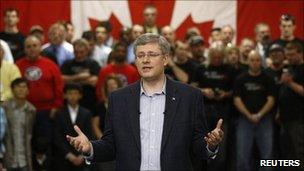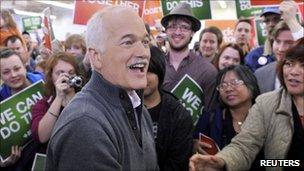Canada election: High turnout in early voting
- Published

Mr Harper's minority government was forced into an election after a non-confidence vote in parliament
More than two million Canadians have cast early votes ahead of the 2 May general election, marking a 35% rise compared with the 2008 election, officials have said.
Elections Canada said the number indicated a strong turnout but warned the count was only preliminary, with not all polling stations reporting.
Meanwhile, the New Democratic Party has made unexpected gains in opinion polls.
A federal general election was prompted by a non-confidence vote in parliament.
The vote came after Prime Minister Stephen Harper's Conservative minority government was found to be in contempt of parliament because of its failure to disclose the full costs of anti-crime programmes, corporate tax cuts and plans to purchase stealth fighter jets from the US.
'High turnout'
Elections Canada reported that 2m Canadians had taken advantage of early voting on Friday, Saturday and Monday, a 34.5% increase from 1.5m voters in 2008.
"There was a higher than expected turnout this past weekend at the advance polls," Marc Mayrand, Canada's top election official, said in a statement, external.

The New Democratic Party, led by Jack Layton, has made unexpected gains in opinion polls
Mr Harper's Conservatives were seen as frontrunners going into the election, but recent polls suggest the left-leaning New Democratic Party is making surprising gains.
An online poll, external by polling firm Angus Reid for the Toronto Star newspaper, released on Wednesday, placed the Conservative Party at 35%, below the number needed to secure a majority of the 308 seats in the House of Commons.
A Canadian political party needs roughly 40% of the vote to win a majority in the House of Commons. Winning a majority is also possible if the gap between the front-runners is more than 10 percentage points.
The same survey put the New Democrats at 30%, while the Liberal Party, which entered the campaign in second place in the polls, trailed at 22%.
However, analysts say the New Democratic Party and the Liberals are vying for the same segment of the electorate, which could split voters and ultimately contribute to a Conservative win.
"The possibility of a majority mandate for the Conservatives hinges on voter turnout and on the way the centre-left vote will split in the ridings [electoral districts] that are being defended by Liberal incumbents," Angus Reid said in a release.
Strategist fired
Mr Harper has said that if his party fails to win a majority, the opposition parties will defeat his government in the House of Commons and form a coalition.
But Liberal Party leader Michael Ignatieff has denied plans for a coalition, and the New Democrats' leader Jack Layton has said he is prepared to work with any party to advance his agenda, which includes boosting the corporate tax rate and introducing a cap-and-trade system to combat greenhouse gas emissions.
Meanwhile, Canadian media reported on Wednesday that Mr Harper's government had fired a key strategist after he was exposed as a source for a Sun Media story last week that alleged Liberal Party leader Michael Ignatieff played a role in the Iraq war.
Patrick Muttart, who was Mr Harper's former deputy chief of staff and chief strategist in his 2006 campaign, reportedly leaked a photograph and information that suggested Mr Ignatieff had aided US military planners in the run-up to the 2003 Iraq invasion.
The Conservative Party has denied any wrongdoing in the incident and Sun Media officials have called the information false.
Mercury, a public affairs and strategy firm for which Mr Muttart works, said in a statement that he had at no time misled or intended to mislead Sun Media.
- Published22 April 2011
- Published21 April 2011
- Published13 April 2011
- Published5 April 2011
- Published8 April 2011
- Published27 March 2011